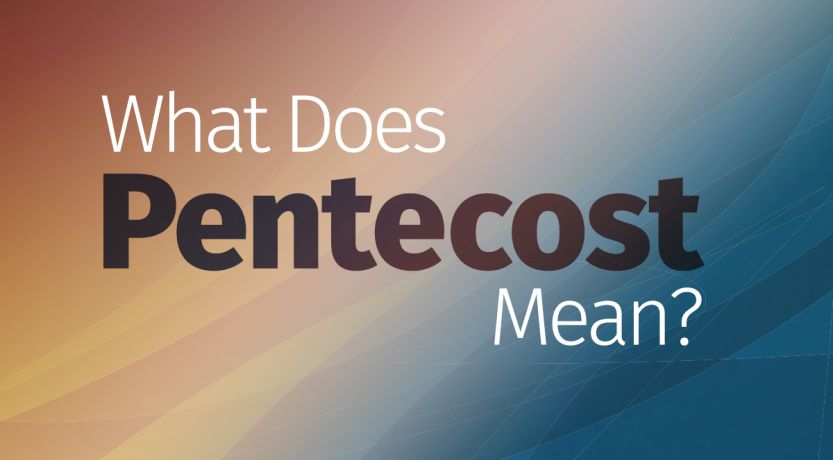Tomorrow, Sunday, 31st May, is Pentecost
What Does Pentecost Mean?
“Pentecost has special meaning for people of all nationalities and backgrounds. It marks the beginning of the Church, the gift of the Holy Spirit and more.

Pentecost is a festival observed by Catholics, Protestants, Jews and the Church of God. Many people don’t know the background of this holy day or why these groups often celebrate it on different days.
Within mainstream Christianity (Catholics and Protestants alike), many congregations recognize the biblical teaching that Pentecost was the day the Holy Spirit was first given to Christians. They consider it, in effect, to be the birthday of the New Testament Church.
Some congregations, however, give no special attention to this festival. The reasons some within mainstream Christianity choose not to observe Pentecost vary.
Some suggest that there are so many events in church history and on church calendars that it is hard to know which ones to observe. Others don’t celebrate Pentecost because of an uneasy feeling about anything connected with charismatics, who mistakenly believe it is necessary to recreate the supernatural events of the first Pentecost today.
In this article, let’s consider what the Bible teaches us about this day and some of the questions surrounding it.
What was Pentecost in the Old Testament?
Pentecost is one of the annual holy days God revealed to the ancient Israelites.
The seven feasts of the Lord are found in Leviticus 23. They are Passover, the Feast of Unleavened Bread, the Feast of Weeks (called Pentecost in the New Testament), the Feast of Trumpets, the Day of Atonement, the Feast of Tabernacles and the Eighth Day.
Some people refer to these observances as the feasts of the Jews. But, while God did indeed give these to Israel, including the Jewish people, it is important to note that God says, “These are My feasts” (Leviticus 23:2), and that Moses referred to them as “the feasts of the LORD” (verse 44).
What we note from these passages is that Pentecost is a feast of God. These festivals do not belong solely to the Jews. They are God’s feasts and are to be observed by His people, no matter what their nationality or ethnic background might be.
What does Pentecost mean in Greek?
Pentecost holds an interesting distinction among God’s commanded holy days. Of all the annual observances given by God to the ancient Israelites, this is the only one that has been commonly known to Christians since the first century by its Greek name—Pentecost, meaning “the fiftieth day” (Thayer’s Greek Definitions).
“The fiftieth day” is related to the name of the festival in the Old Testament—the Feast of Weeks (Exodus 34:22; Numbers 28:26; Deuteronomy 16:10)—and the way the date of its observance was determined. God’s instructions were to “count fifty days to the day after the seventh Sabbath” and that day was to be proclaimed “a holy convocation” (Leviticus 23:16, 21).
The Feast of Weeks was also called “the Feast of Harvest” in Exodus 23:16, because it was associated with firstfruits—the early part of a harvest and the first harvest of the year in Canaan.
As Numbers 28:26 says, “Also on the day of the firstfruits, when you bring a new grain offering to the LORD at your Feast of Weeks, you shall have a holy convocation. You shall do no customary work.”
Pentecost: what happened?
Consider the events that led up to the momentous Pentecost of Acts 2.
Three days and three nights after His crucifixion, Jesus rose from the dead, and during the next 40 days He appeared multiple times to His disciples (Acts 1:3).
In addition to talking to them about the Kingdom of God, Jesus Christ told them to wait in Jerusalem because “you shall be baptized with the Holy Spirit not many days from now” (Acts 1:4-5).
Just a few days later, as His disciples assembled in Jerusalem to observe Pentecost, Christ’s promise that they would receive “power from on high” came true (Luke 24:49). As the Holy Spirit descended upon His faithful followers, it appeared as tongues of fire, and His disciples began to miraculously speak in foreign languages (Acts 2:3-4).
These awesome events on the Day of Pentecost in A.D. 31 launched the New Testament Church. That same day an additional 3,000 people responded to a moving message by the apostle Peter. They repented of their sins, were baptized and then received the Holy Spirit. From this amazing beginning, the Church of God began to rapidly expand throughout the Roman Empire.
What Pentecost means today
Pentecost is an annual festival commemorating the beginning of the New Testament Church of God. Even more important, it is a reminder for each of us that God’s Holy Spirit is now available to all who repent of their sins, are baptized, and continue to follow and obey Him (Acts 5:32).
As Peter explained almost 2,000 years ago, “Repent, and let every one of you be baptized in the name of Jesus Christ for the remission of sins; and you shall receive the gift of the Holy Spirit” (Acts 2:38).
There is still another meaning to Pentecost that is overlooked by many because they don’t understand that God’s plan of salvation for mankind has several stages.
The concept of firstfruits—the first part of a harvest—was an integral part of the Old Testament observance of this festival, and it continues to have meaning for us today. God must first call people before they can repent of their sins and receive the Holy Spirit, which identifies them as Christians who will receive eternal life.
Jesus emphasized this point, saying, “No one can come to Me unless the Father who sent Me draws him” (John 6:44).
Those who are called by God during this present age and who respond to God’s call are the “firstfruits” of His plan of salvation for mankind. They have a part in preparing for an even greater harvest of people to follow.
Our merciful God, who wants all to be saved, has planned more than one time or age for humans to be called and have their opportunity for salvation. God determines when each person will be given the opportunity for salvation.
How is Pentecost calculated?
Although many religions observe Pentecost, albeit with different names and meanings, they celebrate it on different dates.
- Judaism observes Shavuot on Sivan 6, according to the Hebrew calendar.
- Mainstream Christianity observes Pentecost on the 50th day after Easter, inclusive of both days.
- The Church of God observes this holy day on the 50th day starting with the Sunday during the Days of Unleavened Bread.
Why are there so many variations in calculating this festival?
How most churches calculate Pentecost
The reason for mainstream Christianity’s date for Pentecost is pretty obvious to students of history. It’s connected with the change from the biblical Passover to Easter.
The misguided, breakaway version of Christianity, which separated itself from the original Christianity founded by Jesus and His disciples, changed Passover to Easter (the name of a pagan goddess of spring and fertility). At the same time, they also changed its date and meaning.
Those who celebrate all seven feasts of the Lord and rehearse their meanings each year continually find deeper meaning in them.
Although there is no biblical directive to observe Easter, the leaders of this church decided that they would observe it to honor the resurrection of Jesus—rather than observe the biblical Passover to commemorate the death of Christ.
This version of Christianity set the method for calculating Easter so it could not fall on Passover.
Although this may not have been the direct intent of the calculation, other decrees by the Catholic Church clearly show that anti-Semitism was a driving force behind their reasons for abandoning worship on Saturday and the traditional, annual observance of Passover on the 14th day of the first month of the Hebrew calendar (Leviticus 23:5). Their founders despised the Jews and didn’t want their religion to look similar to that of the Jews.
How most Jews calculate Pentecost (Shavuot)
In the first century, when Jesus’ followers observed Pentecost and received the Holy Spirit, there is no mention in the Bible of any concern or disagreement over the date. Yet there were multiple Jewish sects—including the Sadducees and Pharisees—who had differing beliefs and practices.
The Sadducees, who were members of the priestly sect, were in charge of the temple and the worship that occurred there. But, as the Encyclopaedia Britannica explains, “The Sadducees and Pharisees were in constant conflict with each other, not only over numerous details of ritual and the Law but most importantly over the content and extent of God’s revelation to the Jewish people” (“Sadducee”).
In addition to their disagreements over whether there could be a resurrection, angels and spirit (Acts 23:8), these competing sects differed in how they understood the instructions for calculating Pentecost found in Leviticus 23.
The Encyclopaedia Judaica says, “The Sadducees (and later the Karaites) understood the term ‘Sabbath’ in these verses [Leviticus 23:11, 15, 16] literally, hence, for them Shavuot always falls on a Sunday” (1971, Vol. 14, p. 1319, “Shavuot”).
But after the destruction of the temple in Jerusalem in A.D. 70, the Pharisaic beliefs became the predominant teaching of Judaism. The way most Jews now calculate Shavuot is to count 50 days from the annual Sabbath of Passover (as the Jews call the first day of Unleavened Bread). This leads to a fixed calendrical date of Sivan 6 each year.
How the Church of God calculates Pentecost
The Church of God carefully follows the biblical instruction in Leviticus 23:16 to “count fifty days to the day after the seventh Sabbath.”
Since the word Sabbath in this verse clearly refers to the weekly Sabbath rather than an annual Sabbath, we understand that the Sabbath that comes before the count to 50 must also be a weekly Sabbath—not an annual Sabbath.
The Church also notes that if God intended the Feast of Weeks, or Pentecost, as it is known today, to be observed on a fixed date (Sivan 6), He could have inspired that date to be recorded in Scripture. All the other holy days have fixed dates, and Pentecost could have been designated on a fixed date as well—if that were God’s intent.
Instead, the scriptural account emphasizes that Pentecost has to be counted each year. The reason is that the day of the week when the Days of Unleavened Bread begin varies from year to year. By counting 50 days beginning with the Sunday during the Days of Unleavened Bread (as designated by Scripture), we always come to Sunday.
What does Pentecost mean for you?
Those who celebrate all seven feasts of the Lord and rehearse their meanings each year continually find deeper meaning in them. You can find the dates for Pentecost and other festivals according to the biblical calculation on our “Festival Calendar.”
What Is Pentecost to the Jews?
In Judaism the festival is called by its Hebrew name, Shavuot. This means weeks or sevens, which alludes to the instruction to count 50 days. This feast occurred during the first harvest of the land, and Jewish tradition says that this day commemorates God giving the ancient Israelites the 10 Commandments on Mount Sinai.
Jews often read the book of Ruth at this time of year. Their reasons for doing so “are that the book takes place at the time of the barley harvest, that Ruth’s assumption of Naomi’s religion reflects the Israelites’ acceptance of the Torah at Sinai, and that King David, who is alleged to have died at this time of year according to rabbinic tradition, is mentioned at the end of Ruth” (“Shavuot 101,” myjewishlearning.com).
What Is Pentecost Sunday?
Pentecost Sunday is the Sunday that many Catholic and Protestant congregations observe as the beginning of the New Testament Church and as the day the Holy Spirit was given. Unfortunately, they do not always do so on the biblically authorized date.
As previously noted, the Feast of Weeks, or Pentecost, was to be determined by counting—beginning with the day after the Sabbath—“fifty days to the day after the seventh Sabbath” (Leviticus 23:15-16).
Since the biblical Sabbath has always been and continues to be on Saturday, the 50th day after counting seven Sabbaths will always be a Sunday.
Although mainstream Christianity gets Pentecost Sunday on the right day of the week, it does not follow the biblical instruction to begin the 50-day count to Pentecost with the Sunday that falls during the Days of Unleavened Bread. Instead, mainstream Christianity begins its count from Easter. Some years (such as 2020) these dates coincide, but many years they do not.” From: https://lifehopeandtruth.com/life/plan-of-salvation/pentecost/what-does-pentecost-mean/?
What will Pentecost mean for you this year? Study more in our article “The Miracle and Meaning of Pentecost.”
_______
Importance of Pentecost
Acts 2:1“When the Day of Pentecost had fully come, they were all with one accord in one place.
What would have happened if the disciples hadn’t all gathered together to celebrate God’s Feast of Pentecost? The fact that God used this annual festival as the date to start His New Testament Church is no accident. Neither was the fact that Christ was crucified on Passover.
Each of the “festivals of the LORD” has great meaning to Christians today.
Learn more about these festivals and their meanings in our free booklet From Holidays to Holy Days: God’s Plan for You. From: https://lifehopeandtruth.com/bible/blog/the-importance-of-pentecost/?
_________
More from a different church: The Feast of Weeks - Pentecost / Shavuot
________
Update
Not much happened this week. My youngest granddaughter, Michelle, had another birthday, I think she is 27 now.
Found out that my insurance company will provide the transportation to the hospital on the 11th., there and back. That is a relief.
Took a neighbor to the doctor, but I had to wait for her outside on a porch park bench because they don’t let non-patients inside. Just like they wouldn’t let her stay in the waiting room when I went to the doctor, she had to come in the room with me. Things are going to be different for a long time.
Drove another neighbor to pay their car insurance in Bryan because they couldn’t do it online as it was a day overdue. That meant another welcome visit to an HEB grocery store. I can always find some good organic food there, so I bought Swiss Chard, Bok Choy, and some other things that I can’t get in this little 4-traffic-light town.
A couple of trips to the local thrift shop netted a few things. Like a long under-bed box on wheels with a lid for $1, and a couple of really cute blue and white small oven mitts. These are different, like clamshells, they are just big enough to put your fingers and thumb in each side.
My neighbor and I went to the Bible study at church today. It is still on Zoom, but even when the church opens back up next week they are going to do the Bible study on Zoom each week, for those who can’t get there. The sermon was about Ruth and Naomi, and it wasn’t until I got home I realized that this is often the subject at Pentecost because they both take place at barley harvest time.
Of course, the main reason the Jews assigned Ruth to Pentecost is because the time setting of the story is set right after the Wavesheaf Offering had been made down to the day of Pentecost. Ruth 1:22 So Naomi returned, and Ruth the Moabitess her daughter-in-law with her, who returned from the country of Moab. Now they came to Bethlehem at the beginning of the barley harvest.
For the first time in many weeks, I will be thinking about what dish to take to the church potluck for the Sabbath day.
 On Monday, May 25, most schools, federal offices and some businesses in the United States will be closed to observe Memorial Day. Memorial Day is a U.S. holiday remembering the Americans who died in all the wars fought throughout American history.
On Monday, May 25, most schools, federal offices and some businesses in the United States will be closed to observe Memorial Day. Memorial Day is a U.S. holiday remembering the Americans who died in all the wars fought throughout American history. Photos.com
Photos.com Photos.com
Photos.com Joshua Ness/Unsplash
Joshua Ness/Unsplash road trip with raj/Unsplash
road trip with raj/Unsplash Ant Rozetsky/Unsplash
Ant Rozetsky/Unsplash












